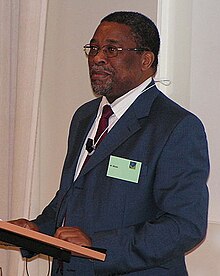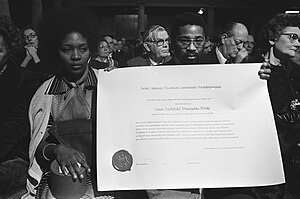Moeletsi Mbeki
 From Wikipedia - Reading time: 5 min
From Wikipedia - Reading time: 5 min
Moeletsi Goduka Mbeki | |
|---|---|
 Mbeki in Leiden, 2007 | |
| Born | Moeletsi Goduka Mbeki 9 November 1945 |
| Nationality | South African |
| Occupation(s) | Political and economic commentator |
| Known for | Deputy chairman South African Institute of International Affairs |
| Parents |
|
| Relatives |
|
Moeletsi Goduka Mbeki (born 30 November 1945) is a South African political economist and the deputy chairman of the South African Institute of International Affairs, an independent think tank based at the University of the Witwatersrand, and a political analyst for Nedcor Bank. He is a member of the executive council of the International Institute for Strategic Studies (IISS) which is based in London. He is the younger brother of former President Thabo Mbeki and son of ANC leader Govan Mbeki. He has been a frequent critic of President Mbeki.[1]
Career
[edit]
Moeletsi Goduka Mbeki has a background in journalism, with a resume that includes a Harvard University Nieman Fellowship and time at the BBC. He worked for The Herald newspaper as a journalist while in exile in Zimbabwe.He often acts as a political commentator in South Africa, and is the author of a paper titled "Perpetuating Poverty in Sub-Saharan Africa", published on 30 June 2005 by the International Policy Network. He was a media consultant for the ANC in the 1990s, and is currently the chairman of Endemol South Africa, a TV production house, and KMM Review Publishing[2] and[3] Africa.[4] He has also been director of Comazar, which rehabilitates and grants concessions to railway networks in Africa.
In 2003 it was revealed by John Perlman that the SABC had blacklisted a lot of political commentators and that Moeletsi was one of them, possible due to his political views. Moeletsi generated some controversy when he said that Africa was governed better under colonial rule than today.[5] (See October 2007 in rail transport). In October 2006 Moeletsi Mbeki applied for an order to have Jonathan Moyo jailed the next time he visits South Africa. He has been known to oppose certain Black Economic Empowerment (BEE) deals in South Africa[6][7] and has written articles for the Cato Institute, a USA-based libertarian think tank.[8]
With his book Architects of Poverty: Why African Capitalism Needs Changing in 2009 he triggered a debate about governance, ethics and moral values in African governance processes.[citation needed]
Other activities
[edit]- International Institute for Strategic Studies (IISS), Member of the Advisory Council[9]
Writings
[edit]- Moeletsi Mbeki: Architects of Poverty. Why African Capitalism Needs Changing, Central Books, April 2009, ISBN 1770101616
- Moeletsi Mbeki: Advocates for change. How to overcome Africa's challenges, Picador Africa, 2011, ISBN 978-1-77010-120-3
He has written many articles about the political and economic situation in South Africa, Zimbabwe and the rest of Africa.
References
[edit]- ^ An IOL online article about the last cabinet meeting of the Mbeki Administration. http://www.iol.co.za/index.php?set_id=1&click_id=3086&art_id=nw20080924153804200C107252
- ^ "Mbeki, Moeletsi - South African businessman and political analyst". Archived from the original on 3 July 2007. Retrieved 7 March 2008.
- ^ "Moeletsi Mbeki Paints A Gloom Picture For Zimbabwe". 18 March 2007.
- ^ "Moeletsi Mbeki: Political economist". Moneyweb Power Hour. 25 February 2008.
- ^ "DispatchLIVE". DispatchLIVE.
- ^ Why BEE should be abolished IOL
- ^ "Gold Council mulls investment unit spin-off". mineweb.net. Archived from the original on 12 November 2006. Retrieved 14 November 2017.
- ^ Moeletsi Mbeki (15 April 2005). "Underdevelopment in Sub-Saharan Africa. The Role of the Private Sector and Political Elites" (PDF). cato.org. Retrieved 30 June 2023.
- ^ Advisory Council International Institute for Strategic Studies (IISS).
 KSF
KSF